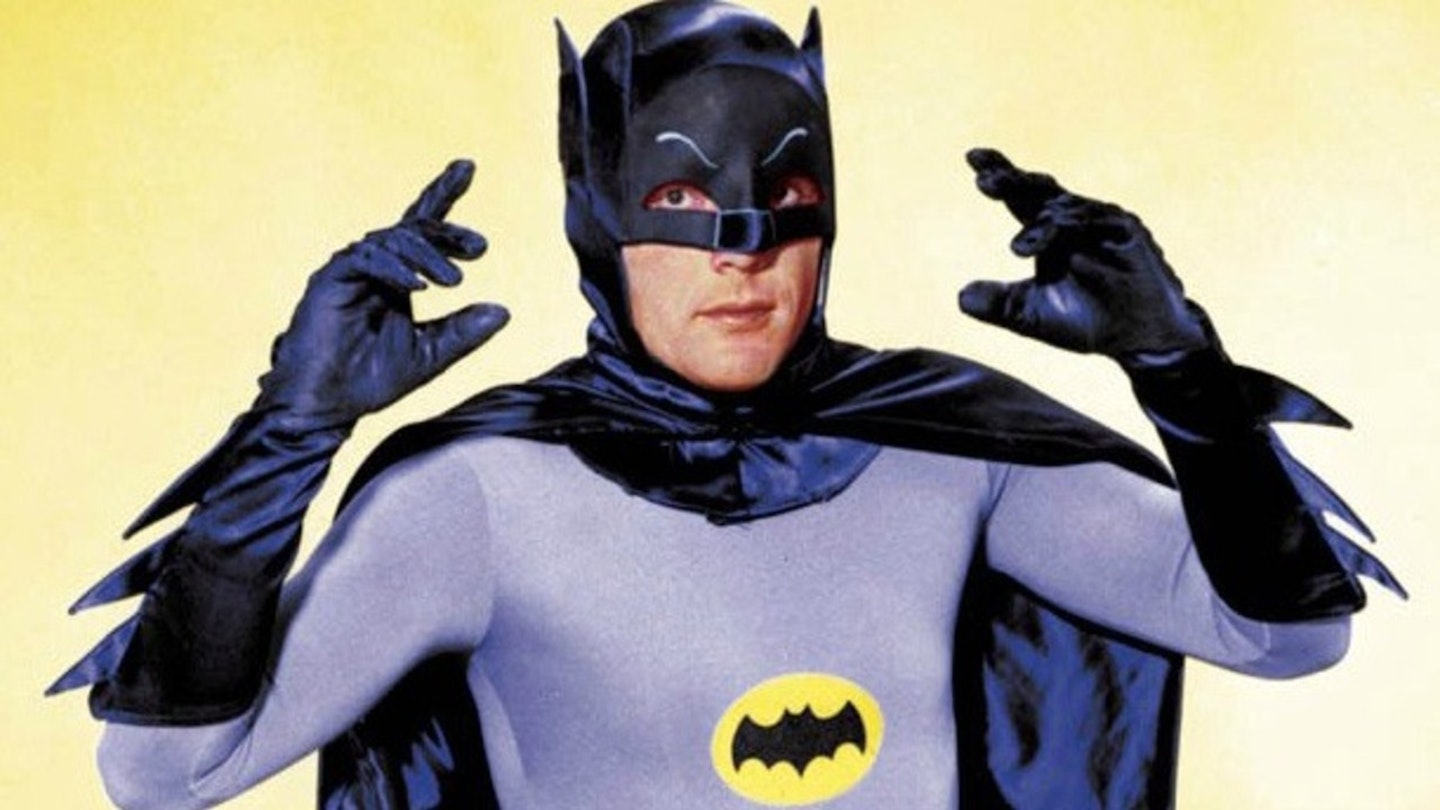This article first ran in the December 2016 issue of Empire.
"Bredren!" booms Adam West. Right from the moment he greets Empire, on the phone from his Idaho home, the star is exactly as playful and off-the-wall as you’d hope. “A title like Empire, it’s so grand!” he declares. “Is it the Byzantine Empire, the Roman Empire...?” Everything’s a hoot; nothing’s taken too seriously — each time he catches himself dwelling on something, he exaggerates it for comedic effect. He’s pure, uncut Adam West. And by Adam West, of course, we mean Batman.
West has been synonymous with the character now for five decades. His Batman TV show was first broadcast on the ABC network in January 1966, followed six months later by a film. Since then, West has been inseparable from his do-gooding, super-droll take on the Caped Crusader. Having created a wholly unique vocal delivery, he’s long since adopted it as his natural speaking voice. “Alright,” he says as we get down to business, “this is Batman the elder.” Indeed. He’s 88. And he’s just played Batman again.
Batman: Return Of The Caped Crusaders is a brand-new, feature-length animated take on ’60s Batman, voiced by three of the original cast members: West as the Dark Knight, Burt Ward as Robin, and Julie Newmar as Catwoman. It was made to commemorate the 50th anniversary of the show, and happily the original tone — the irreverence, the self-awareness, the sheer ridiculousness of it all — remains intact.
“I thought, ‘My God, it’s about time you guys called me up!’” says West about being approached for the project. “And it’s just nice to be back! What goes around comes around, you know.”
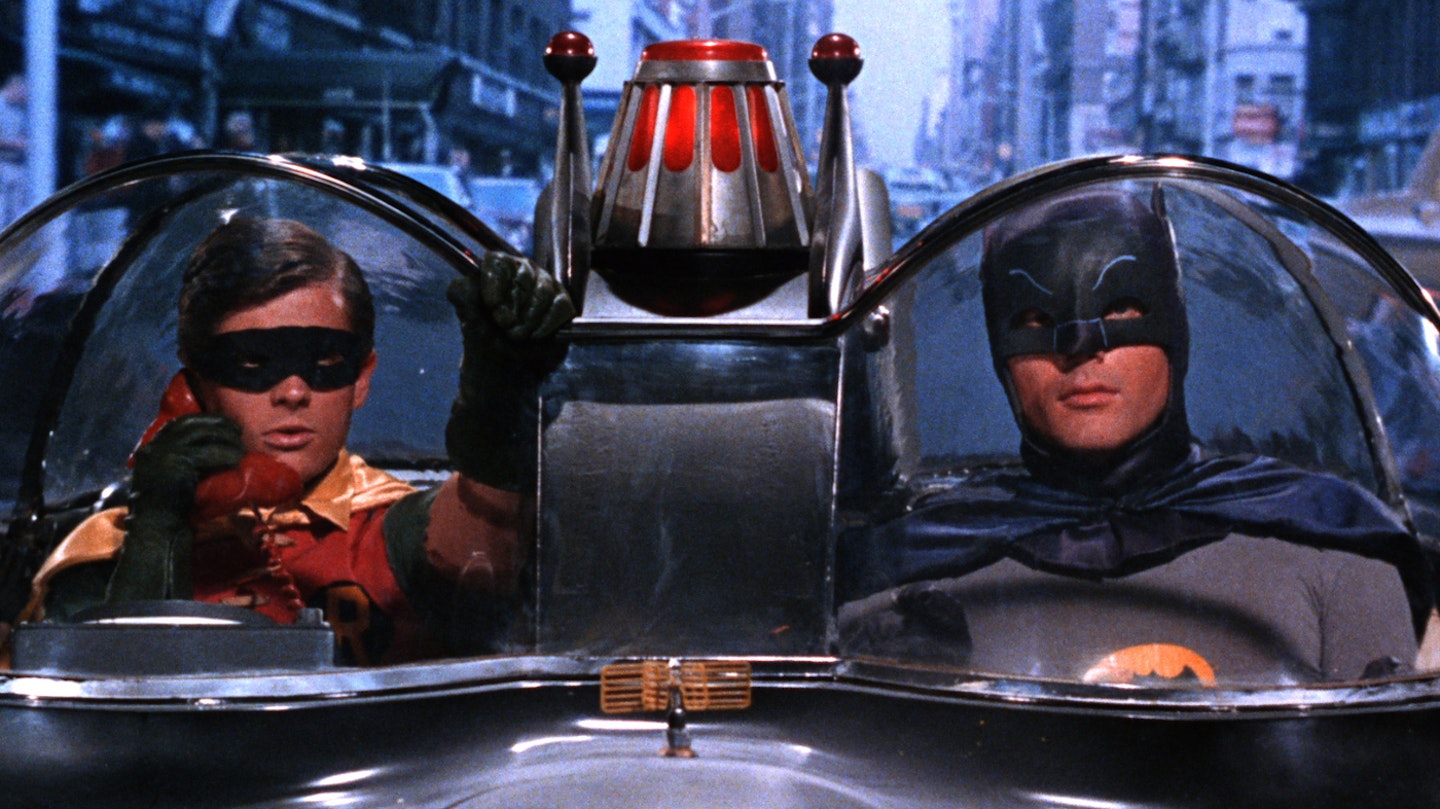
West was 37 when Batman burst into his world. A jobbing actor, he’d just done a stint in Europe making Spaghetti Westerns, and had recently starred in a film called Robinson Crusoe On Mars. But it was a TV ad for Nestlé, in which West played a smooth, wisecracking character called Captain Quik, that bagged him his new gig.
The commercial was seen by producer William Dozier, the man hired by the ABC network to bring DC Comics’ Batman to the screen. Dozier and writer Lorenzo Semple Jr had been grappling with the adaptation, finally deciding to push silliness to the fore. Batman would mix colourful action with deadpan satire, paying tribute to its comic-book heritage while simultaneously parodying it. And as soon as Dozier saw West arching a wry eyebrow on his TV, he knew they had their hero. West, though, was initially hesitant. “My agent said, ‘Kid, you gotta see them, they’re interested in ya,’” he remembers. “I said, ‘What’s it called, Lou?’ He said, ‘Batman.’ I said, ‘Really? I’m trying to have a serious career here.’ But I got curious.”
He read the pilot, thought it was hilarious, and successfully screentested. Burt Ward, meanwhile, was a 19-year-old karate blackbelt, fresh out of college and selling real estate. More than 1,000 actors auditioned for Robin, but watch Ward’s exuberant test online and you can see why he got the part. Having brought a friend, he does some glorified somersaults, throws the friend over his shoulder, then says, “I’m gonna give an exhibition of karate,” before smashing a board with his hand.
Batman had a surfing contest with the Joker - I thought that was really funny.
Right from day one, West brought his own ludicrous rhythms to the character: he’d move slowly and ponderously as Batman mused over a clue, then erupt with adrenaline when he deciphered it. Not every network executive was impressed. “I got many notes, many memos, many phone calls,” West says. “‘Kid, what are you doing?! Don’t do that!’ And I said, ‘Well, I’m sorry, I have to do it this way or it’s not going to last, or be funny for the adults.’ I saw the humour in it.” Upon viewing the first dailies, the crew agreed.
The first-ever episode, ‘Hi Diddle Riddle’, set out the show’s stall. After a cake explodes in the Moldavian Prime Minister's face, revealing a riddle, Commissioner Gordon (Neil Hamilton) and Chief O’Hara (Stafford Repp) summon Batman, who pursues the Riddler (Frank Gorshin) with Robin. They're led to the What A Way To Go-Go discotheque, where Batman, in full garb, gets down with a seductive siren, putting an improvised spin on ’60s dance craze the Watusi. Then his drink is spiked and the episode ends on a cliffhanger, the drugged Batman useless as Robin is strapped to a table. "Is this the end of our dynamic duo?” asks the narration (voiced by by Dozier). It was, of course, only the beginning.
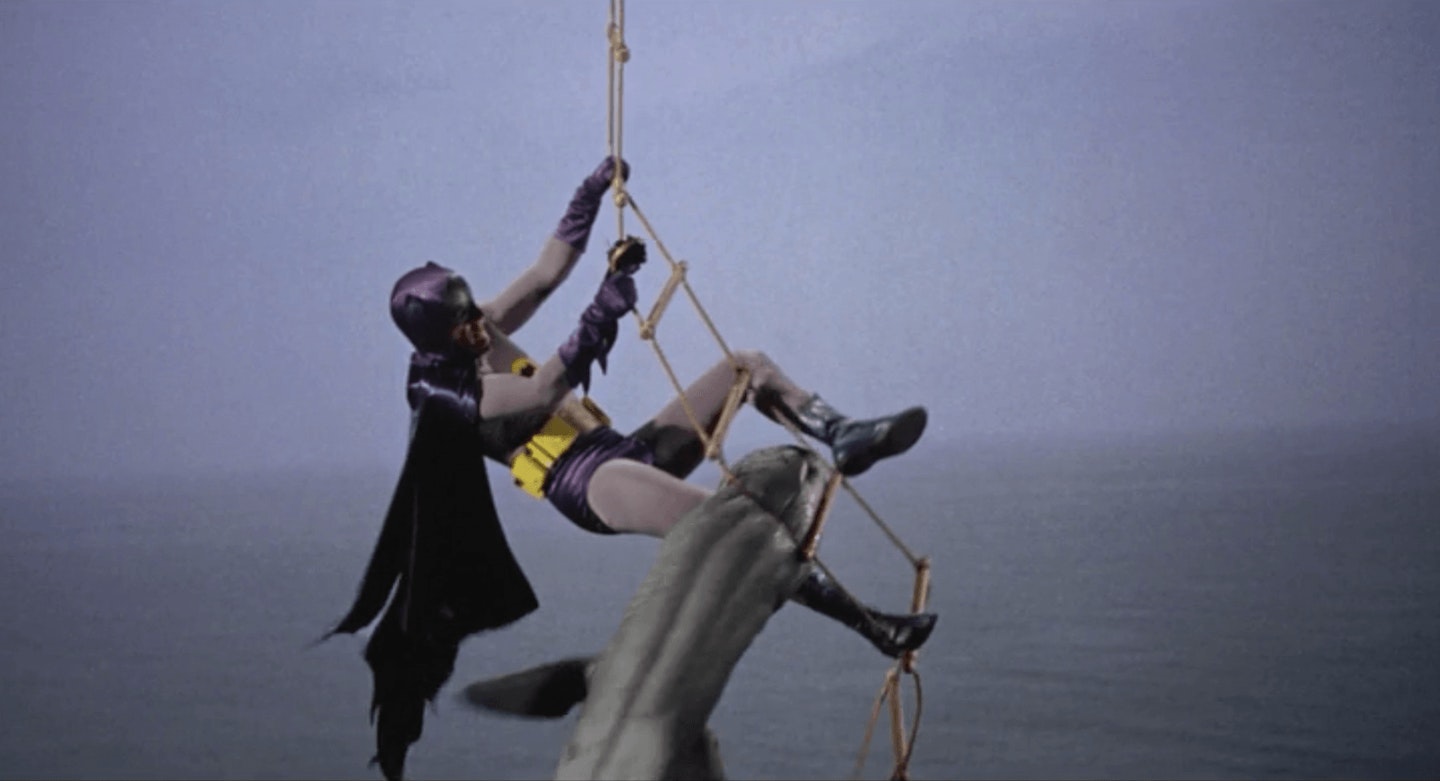
West, reminiscing about his favourite moments, brings up his dance from this episode, later dubbed 'the Batusi'. As we move on to another subject, he interjects, "I can still do it!" He enthuses about the show's vibrancy. "As an homage to the earlier comic books — the more innocent comic books, if you will — we used a lot of primary colours, he says. Colours that people like [Roy] Lichtenstein were using. We were trying to reflect the times, even with the music. Batman had a surfing contest with the Joker - I thought that was really funny."
Airing on 12 January 1966, ‘Hi Diddle Riddle’ seized an immense 52 per cent audience share. For the rest of the first season, two episodes were aired a week, getting equally massive viewing figures. The show was nominated for three Emmys, and was responsible for shifting $75 million-worth of Batman merchandise (hello, Joker dog costume and Batman snuggie) in America that year. Half of Hollywood wanted to appear on the show, with guest stars including Shelley Winters, Otto Preminger, Vincent Price and Liberace; for less demanding cameos, the likes of Sammy Davis Jr and Jerry Lewis would pop out of windows as Batman and Robin unconvincingly scaled buildings.
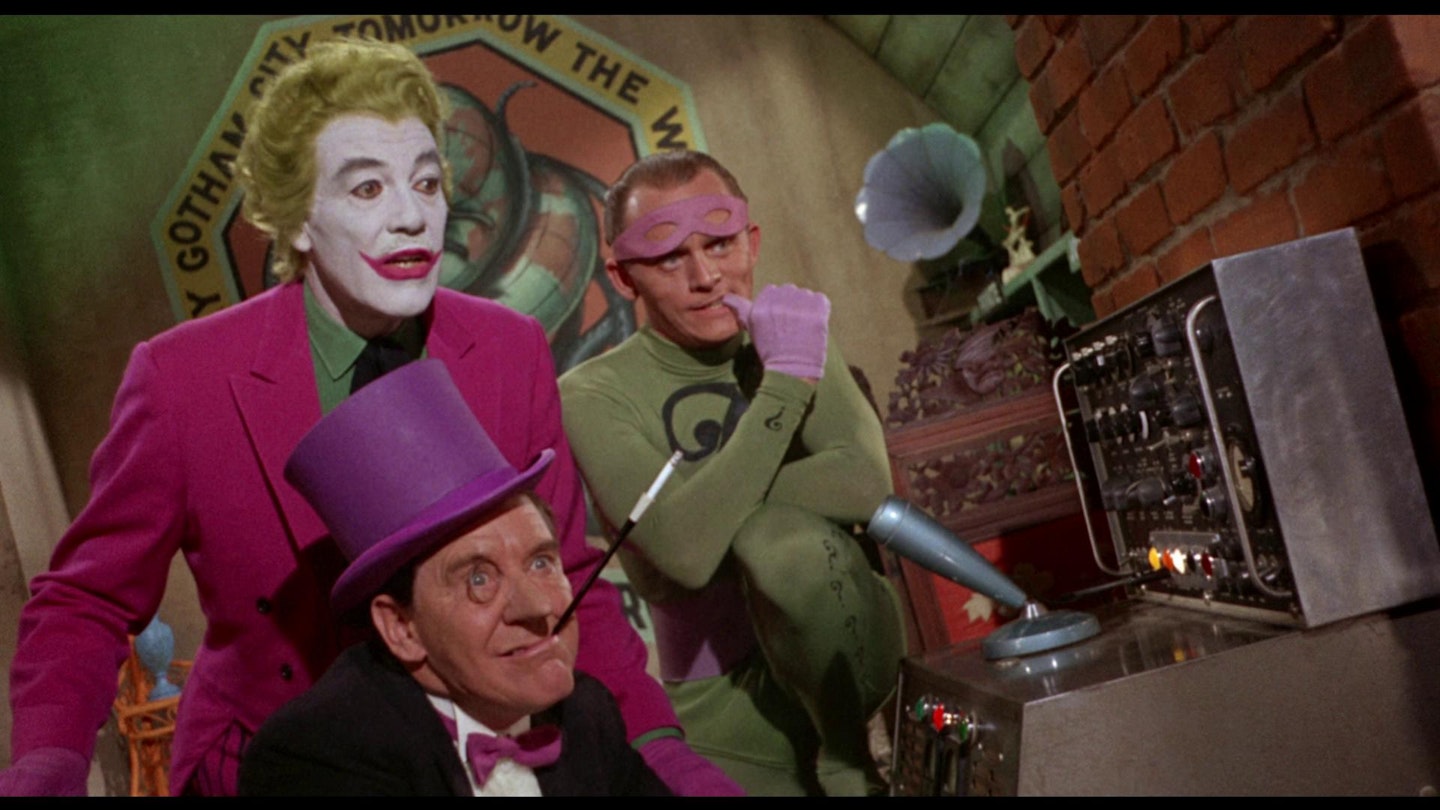
The Batman movie was, admitted Semple Jr, a cash-in. He wrote it in four weeks, only ever doing one draft. The big gimmick, somewhat foreshadowing Suicide Squad, saw the TV show’s four biggest villains team up: the Joker (Cesar Romero), the Riddler (Frank Gorshin), the Penguin (Burgess Meredith) and Catwoman (Lee Meriwether, temporarily replacing the otherwise engaged Julie Newmar).
At $1.5 million, the budget was pumped-up, enabling the crew to build a new Batcopter and Batboat. But the shoot, like the writing period, was shockingly fast. Beginning two weeks after the wrap party for the show’s first season, it was completed in 26 days. Post-production, meanwhile, lasted under a month, with the film rocketed into cinemas on 30 July 1966. Despite all the haste, the film was well-received, with Variety citing its “uniformly impressively improbable” acting. Fans went crazy for several instantly iconic moments: Batman running around Santa Barbara pier trying to get rid of a bomb, Batman fighting off a shark with Shark-Repellent Bat Spray, and the United Nations Security Council (or, as they were called in the film, the United World Security Council) being turned to dust.)
I got many notes, many memos, many phone calls. ‘Kid, what are you doing?!’
West and Ward were now big, blazing stars. “In a sense, I took advantage of it,” West says, adding conspiratorially, “with all of the human pleasures that one could accrue.” Ward has said the pair were “sexual vampires”, especially during the personal appearances they made in costume at weekends, where he claims women were banging on their windows while they were in bed with other women. On one occasion, West and Gorshin attended a Los Angeles orgy, but were asked to leave, naked, when they began talking in character. (Hopefully they didn’t also yell out, “SPLAT!” or, “ZOWIE!”) Heading up the Batman phenomenon was, says West, intense.
But it didn’t last. In part due to the film, the second season was rushed, and quality slipped. Season 3 fared even worse, and as ratings waned, budgets were cut. Kids were still watching, but the adults (who, with their spending power, were needed by ABC) had deserted, and the show was cancelled. NBC offered to fund a fourth season, but the $800,000 sets had already been torn down and destroyed, so that was that: in 1968, after three years and 120 episodes, Batman was Batcanned.
The show rapidly faded from view. In 1970, DC editor Denny O’Neil revamped Batman, making him darker and broodier, in line with Bob Kane’s original 1939 vision, but with a grittier tone to suit the new decade. The 1980s brought graphic novels, with Frank Miller’s The Dark Knight Returns firmly pushing the character into adult territory. All along, the Adam West show was used as an example of what not to do. Kane said the show’s comedic tone had changed the genre for the worse. In an introduction to his book, Miller decried the show’s quips. “For me,” he wrote, “Batman was never funny.”
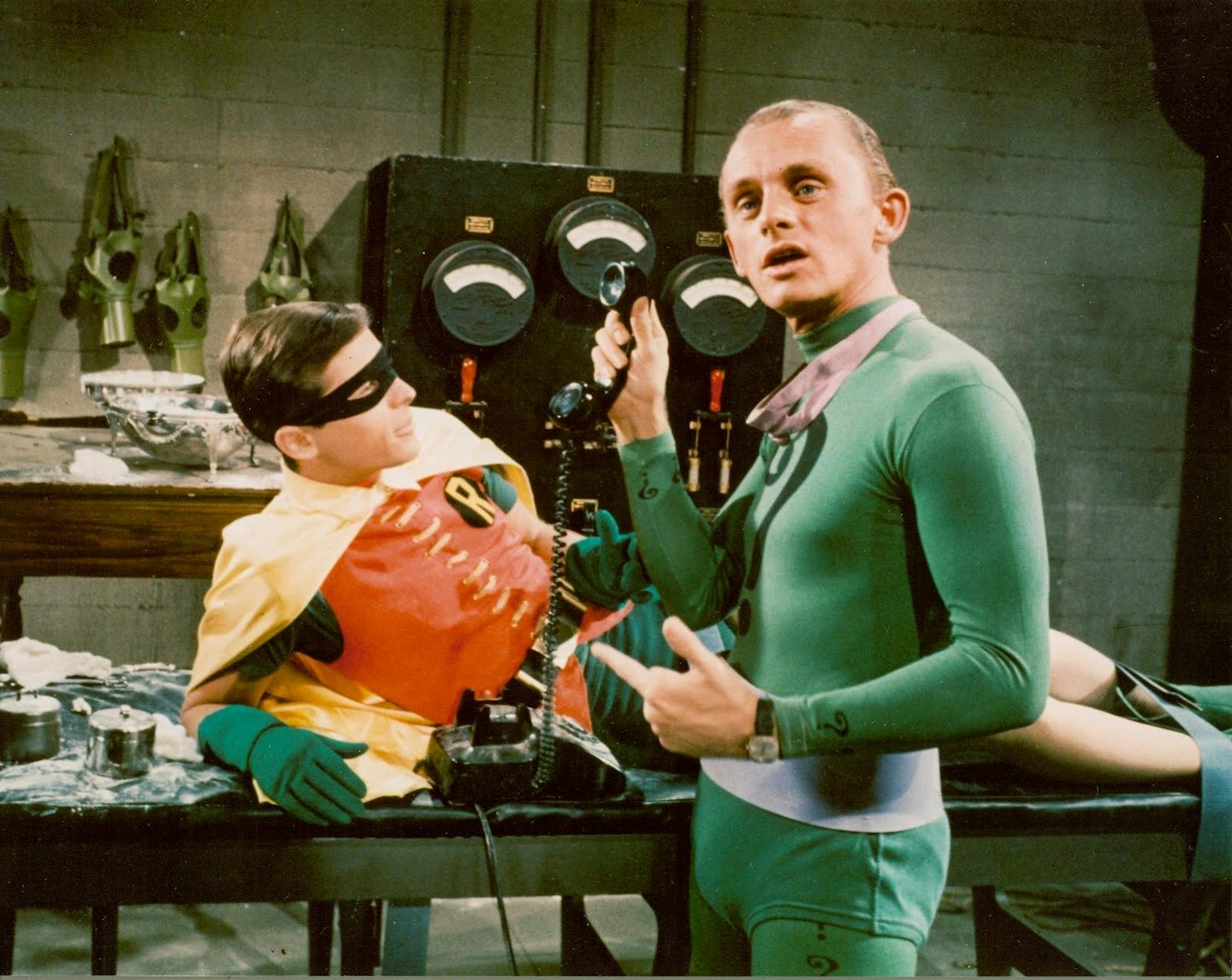
As for West, having thought the show would make him an A-list star, he instead found it typecast him. Needing to work regardless, he did whatever films he could, ending up in the likes of The Happy Hooker Goes Hollywood and Zombie Nightmare. He continued to do appearances as Batman, reaching a personal low when he was fired out of a cannon at a carnival in Indiana. His bank account and self-respect went down, while his alcohol consumption and self-destruction went up. The bat had become an albatross.
“It’s been sheer torture!” he says now, making light of his ups and downs. “We’ve got six children and I’ve had to keep working.” In 1986 he moved with his family from LA to the Idaho farm where he still resides, among elk and bears. From there he saw his status as the sole screen Batman disappear. When Tim Burton’s 1989 film was released, West said he was angry not to have been offered the role. “Even more painfully,” he wrote in his 1994 autobiography Back To The Batcave, “our contribution to the legend was ignored, ridiculed and denigrated by certain of the filmmakers...”
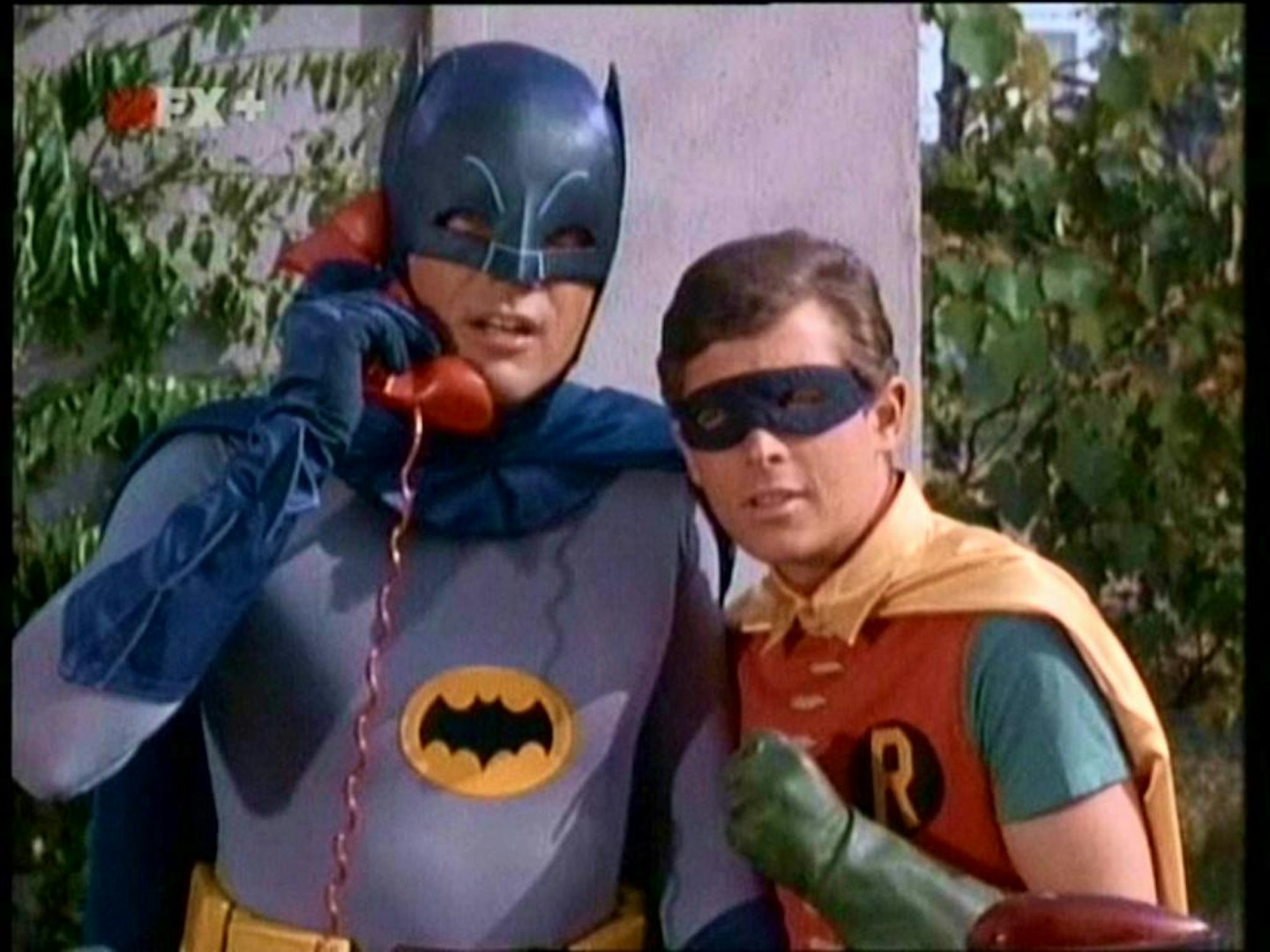
As with every one of the '60s show's jeopardy-packed cliffhangers, however, there has been a happy ending. West’s Batman has enjoyed a revival over the past few years, with a huge new wave of appreciation for the work. At conventions, West and Ward are given wild ovations, with fans telling emotional stories of what the show has meant to them. “To hear a judge or a janitor say that I made a difference in their life, that’s marvellously rewarding,” West says. “One man said I made him want to
be a superhero, and he did the next best thing, which was to join the Marines.” It made an equal impact on pop culture. In Pulp Fiction, John Travolta riffed on the Batusi on the Jack Rabbit Slim’s dancefloor, while Nicolas Cage went full West as Big Daddy in Kick-Ass. Seth MacFarlane cast West as himself on Family Guy, while Hollywood stars regularly pay tribute. When Christian Bale was asked in March this year by Entertainment Tonight to name his favourite Batman, he said, “You can’t beat Adam West.”
I sound like Trump, don’t I? This is terrible.
Batman: Return Of The Caped Crusaders brings it all full circle. “It took a little time,” jokes West of slipping back into character. “About 20 seconds!” We ask if it felt good doing it, and for a while he gets serious. “That’s a very good question,” he says. “I didn’t know whether it would. I just went in and did it. But as we went along I began to feel better about it.” The film is funny, a refreshing rejection of the gloomier Batmen of recent years. “It’s starting to heat up, Batman,” worries Ward’s Robin as the pair, strapped onto a massive replica buffet tray, are pushed into an oven. “But we do smell delicious.” Meanwhile, for a sequence in which the dynamic duo battle the villains in space, Batman’s astronaut’s helmet features Bat-ears. Watching it, you’re struck by how ridiculous the character really is, regardless of how gravely some may treat him. This is all about fun.
And it’s not in isolation: in February we’ll have The LEGO Batman Movie, which, with its knowing, self-parodying yucks takes more than a cue from 1966. In the past 50 years, West’s Batman has been through a lot, but is back with a bang. Return Of The Caped Crusaders exists because of this renewed love of the original show and film, and the recontextualisation must feel good. “I never think of that more than twice a week,” West deadpans. He laughs, then gets serious for a brief moment. “It’s not a matter of being vindicated or anything else: it’s just finally realising that people are recognising what I did. What we did. And appreciating it even more. And it keeps building. Every poll of your favourite Batman, I’m winning!”
He checks his ego, and laughs. “I sound like Trump, don’t I? This is terrible.” Not at all. Holy comeback, Batman! It’s about time.
